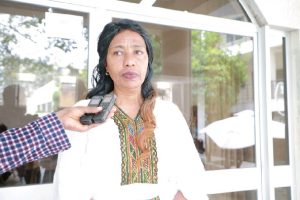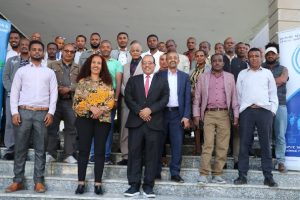
ADDIS ABABA – Ethiopia has been promoting climate-resilient, sustainable economic growth to achieve middle-income country status by 2025, the Policy Studies Institute (PSI) said.
The PSI in collaboration with University of Copenhagen Development Economics Research Group held a conference on ‘Building Resilience to Climate Change in Ethiopia.’
It is aimed to share key lessons and insights from its research and analysis over the past five years since 2019.
Speaking at the occasion, the PSI Vice Director General Teferi Tiyaru said that Ethiopia has made tremendous efforts to promote climate-resilient and sustainable economic growth.
A Climate Resilient Green Economy (CRGE) strategy was introduced in 2011 to achieve middle-income country status by 2025. As part of the CRGE strategy, a resilience strategy for agriculture and forestry was developed and implemented, it was learnt.
Countries such as Ethiopia, which are highly dependent on traditional rain-fed agriculture, livestock farming and livestock products, are the most vulnerable to climate hazards.
It is therefore important to protect the economy from severe negative climate impacts, strengthen resilience and reduce vulnerability to climate change-induced shocks, especially by building resilient smallholder agriculture through innovative policy measures, he said.
“Recent national development initiatives, including the Home Grown Economic Reform (HGER I & II), the National Development Perspective Plan (2021-2030), the Green Legacy Initiative (GLI) and other sectoral plans focused on measures that minimize the negative effects of climate change.”
Ethiopia is already carrying out large-scale afforestation and reforestation and is developing further adaptation initiatives to increase climate resilience by supporting the development of natural ecosystems.
Flagship programs such as the Sustainable Land Management Program (SLMP), the Agricultural Growth Program (AGP) and the Productive Safety net Program (PSNP) all aim to build resilience capacity by improving agricultural productivity, conserving natural resources and reassuring household consumption and optimal use of water resources, he added.
Nevertheless, climate-related shocks still pose a major threat to smallholder farmers.
The recent catastrophic drought in Borena, Somali, Bale and Southern Omo areas; unusual flooding in many parts of the country, land displacement, prolonged dry spells and water scarcity for humans and livestock are common occurrences.
All these show that the country still has some work to do to improve its resilience to shocks, he underscored.
Combating the impacts of climate change by building resilience requires the collective responsibility of all stakeholders at different levels as well as the effective involvement of local communities, development partners, the private sector and other key stakeholders, he noted.
BY TSEGAYE TILAHUN
THE ETHIOPIAN HERALD WEDNESDAY 9 OCTOBER 2024





